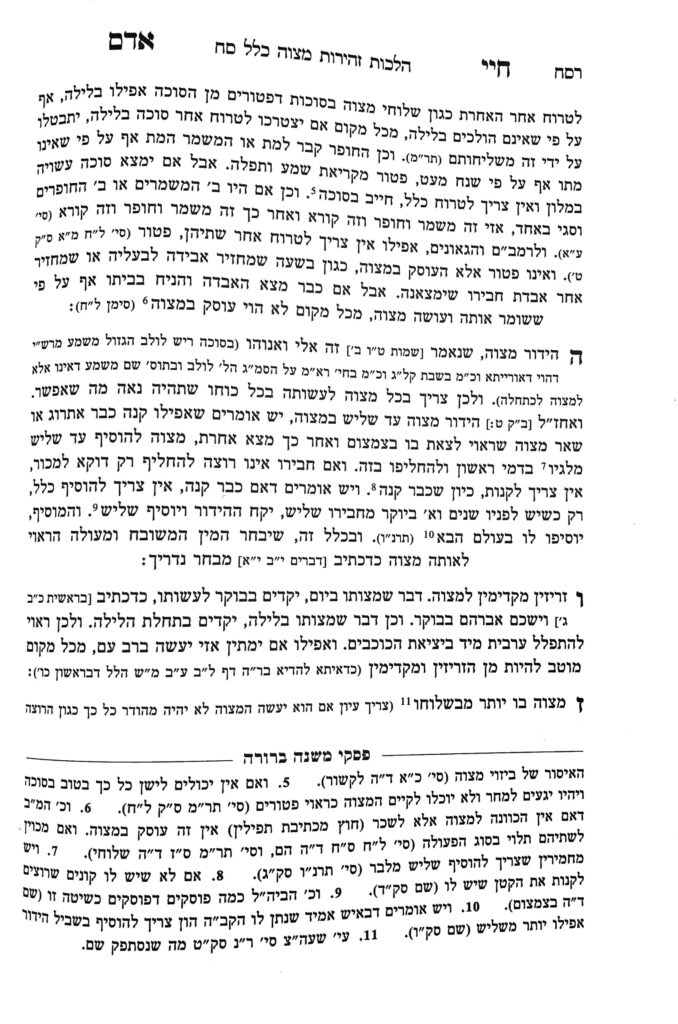We are continuing in siman 7, which discusses the concept of mitzvah bo yoser m’shlucho. We left off discussing the case of the Tevuas Shor, regarding whether one can be mechabed someone else to perform a mitzvah which is incumbent upon themselves. In Yoreh Deah, siman 28, he discusses the question as it regards kisui hadam, but it would apply to other mitzvos as well, such as being mechabed someone else to perform a bris, even though the father is qualified to perform it. The Tevuas Shor explains that if we understand that the purpose of mitzvah bo yoser m’shlucho is to give kavod to the mitzvah, one could argue that greater kavod comes to the mitzvah by giving it to a talmid chochom or otherwise more qualified individual. The baal hamitzvah is not shirking their responsibility, but finding the more appropriate way to fulfill their obligation.
The Tevuas Shor’s idea leads us to discuss what precisely is the logic behind mitzvah bo yoser m’shlucho. Rashi, in Kiddushin 44a, writes that the logic is that when a person performs a mitzvah with their own body, they receive more reward. Rashi would appear to understand the concept along the lines of lefum tza’ara agra, that the more effort one invests in a mitzvah, the more reward they receive. Although we do not perform mitzvos for the purpose of their reward, the reward can be an indication of the level of the mitzvah.
On the other hand, the Rambam brings down this concept regarding the amoraim who would prepare for Shabbos themselves (see shiur 1407), and writes that the logic behind their actions was kavod Shabbos. According to the Rambam, if it is only a logic in kavod Shabbos, the amoraim’s actions do not necessarily indicate mitzvah bo yoser m’shlucho, they just stress the importance of kavod Shabbos. On the other hand, if that is the case, how could the Gemara bring the amoraim as a proof to the concept of mitzvah bo yoser m’shlucho.
The Brisker Rov explains that the Rambam’s point is that we see from the Gemara that there is a greater kavod expressed when a person does something themselves rather than through a shliach. Thus, the amoraim serve as both a proof to the importance of kavod Shabbos, and to the concept of mitzvah bo yoser m’shlucho. We see that the underlying idea behind mitzvah bo yoser m’shlucho is giving kavod to the mitzvah, which would seem to support the opinion of the Tevuas Shor above.
The Brisker Rov continues, and writes that the difference between the opinions of Rashi and the Rambam/Tevuas Shor would be hechsher mitzvah, the preparations put into the mitzvah. According to Rashi, if the logic behind mitzvah bo yoser m’shlucho is to receive more reward, mitzvah bo yoser m’shlucho would apply to the performance of hechsher mitzvah as well. According to the Rambam, if the logic is demonstrating kavod for the mitzvah, mitzvah bo yoser m’shlucho would only apply to the mitzvah itself, and not to the hechsher mitzvah.
The Brisker Rav uses this differentiation to explain another machlokes Rambam and other rishonim related to this topic. The Gemara uses mitzvah bo yoser m’shlucho to explain why a person should preferably perform kiddushin no themselves and not through a shliach. The Rishonim debate what is the mitzvah involved in kiddushin which is being discussed. The Ran holds the mitzvah is pru urvu, and explains that the mitzvah to which the Gemara refers is actually the hechsher mitzvah. The Ran fits with Rashi’s opinion that mitzvah bo yoser m’shlucho applies even to a hechsher mitzvah.
The Rambam’s opinion is that there is an independent mitzvah in the Torah to perform kiddushin. This fits very well with his opinion over here that the logic behind mitzvah bo yoser m’shlucho is kavod, so it does not apply to hechsher mitzvah. However, his opinion does not conflict with the Gemara about performing kiddushin, because he holds kiddushin in a mitzvah.
According to the Rambam, the hiddur of mitzvah bo yoser m’shlucho as it applies to kiddushin does not only apply to the man, but to the woman as well.
Summary
There are two ways to understand the logic behind mitzvah bo yoser m’shlucho. Rashi understands it is to increase reward for the mitzvah. The Rambam understands it is to show kavod for the mitzvah.
According to the Rambam, it comes out that when more kavod will be shown by honoring another with the mitzvah, it would be more appropriate to do so. The minhag is share the honor of a mitzvah.
According to the Rambam, it does not apply to hechsher mitzvah, while according to Rashi it does.



